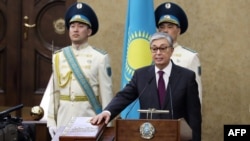Kazakhstan's President Kassym-Jomart Tokayev on Tuesday called a snap election for June as the Central Asian nation seeks a new leader following the shock resignation of its longtime ruler.
Nursultan Nazarbayev, the only leader an independent Kazakhstan had ever known, announced suddenly last month that he was stepping down after nearly three decades in office.
Nazarbayev, who retained significant powers following his resignation, named Tokayev to replace him for the remainder of his term due to finish next year.
Tokayev said the presidential election would be held on June 9 instead.
In a televised address to the nation, Tokayev said he had consulted with Nazarbayev -- known as "Elbasy" or "Leader of the Nation" in Kazakh -- and other top officials before making the decision.
"We must continue to work on the implementation of the strategy of Elbasy," Tokayev said.
"This can be done only by the direct expression of the will of the people... As the acting head of state I guarantee that the elections will be held honestly, openly and fairly."
Tokayev did not immediately say whether he would run though most analysts have tipped him to succeed Nazarbayev, at least in the short-term.
"I don't think there is much doubt it will be him," independent political analyst Aidos Sarym told AFP.
Sarym described Tokayev's decision to call the election as a move to ensure calm and stability in the country of 18 million people following Nazarbayev's surprise resignation.
"This was important for investors, both foreign and local. Business has been bothered by all the uncertainty," Sarym said.
Other reasons are to reassure neighboring countries and stabilize the state apparatus, he said.
With all this taken into account, the leadership had "little choice" but to move towards a snap election, Sarym said.
Daughter 'not going to run'
Nazarbayev's daughter and speaker of Kazakh senate, 55-year-old Dariga Nazarbayeva, who has been widely tipped as a possible successor to her father, on Tuesday reportedly ruled out running.
"No, (Nazarbayeva) is not going to run," her spokeswoman Saule Mustafayeva told the private Tengrinews outlet.
When contacted directly by another news website however, Nazarbayeva did not confirm or deny a potential run.
"Any citizen of the country may run for (the presidency) in accordance with the Constitution and the laws. Political parties determine nominations," she was quoted as saying by Zakon.kz.
The speaker position, which Tokayev previously held, is second in line to the presidency according to the constitution.
Whatever happens, observers doubt the election will be a real contest.
"Announcing elections and the possibility of holding an honest vote are two different things in Kazakhstan," analyst Dosym Satpayev wrote on Facebook.
"The political field has been cleaned of opposition," Satpayev said.
Nazarbayev, 78, now has the constitutional status of "Leader of the Nation" as well as chairmanship of the ruling Nur Otan party and a lifetime position as chief of the security council.
The strongman was credited with transforming the country into an energy powerhouse with growing diplomatic clout, but also accused of clamping down on the opposition and tolerating little dissent.
He ruled Kazakhstan since before it gained independence with the 1991 collapse of the Soviet Union.
The capital was quickly renamed from Astana to Nur-Sultan in his honor following his resignation.
Tokayev visited key ally Russia in his first trip abroad as president last week and discussed strengthening cooperation with President Vladimir Putin.
During the visit, Putin raised the prospect of Russia building a nuclear power plant in the country, a move that would bring Kazakhstan even closer into Moscow's orbit.
The government faces a challenge to tackle growing discontent over falling living standards after Kazakhstan's economy was hit by the 2014 drop in oil prices and western sanctions against Russia, a key trading partner.
Dozens have been arrested while attempting to hold anti-government protests in the country's two largest cities, Nur-Sultan and Almaty, since Tokayev took office.










